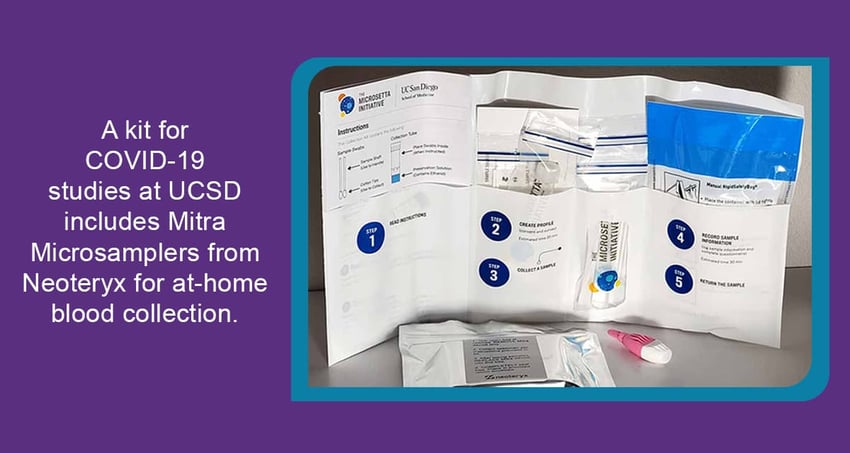Share this
Neoteryx Blood Collection Devices Support UC San Diego COVID-19 Studies
by Neoteryx Microsampling on May 21,2020

The emergence of the coronavirus pandemic has spawned numerous research studies in an effort to find a COVID-19 vaccine and effective treatments. The University of California San Diego School of Medicine has launched multiple SARS-CoV-2 research projects.
One COVID-19 research project launched at UC San Diego involves The Microsetta Initiative (TMI), which normally focuses on human microbiome research. As part of its effort to gather specimens for microbiome science—understanding the bacteria that live in our bodies—TMI had previously created thousands of specimen-collection kits for shipping out to remote study participants. The original kits were equipped to help participants collect fecal, nasal, oral or skin swabs to mail back to the lab. Then the coronavirus pandemic hit.
Pivoting to Meet New Demands Posed by the Coronavirus Pandemic
To meet the new demand for more COVID-19 studies, the TMI team quickly modified its existing specimen collection kits by adding two more types of specimen collection: 1) viral RNA collection (with samples preserved in a buffer of 95% ethanol), aimed at understanding how the virus is transmitted; and 2) blood collection, aimed at understanding if/when people who have been infected with the virus can develop SARS-CoV-2 antibodies.
These key modifications to the kits were made possible through collaborations with device companies that could provide the right tools for remote participants to use easily at home.
To enable remote blood collection, the UC San Diego research team selected Mitra® microsampling devices from Neoteryx. The Mitra device is based on Volumetric Absorptive Microsampling technology (VAMS®), which has been proven in 100+ peer-reviewed papers to deliver high-quality blood samples for lab analysis.
The Mitra devices are designed for simple, remote blood collection by anyone, anywhere. Using a single finger-prick with a lancet, a participant touches the sampling tips within the Mitra devices to the drops of blood on their finger. No messy tubes are required with Mitra. This remote blood collection method is particularly useful now, given the strict social distancing rules citizens must follow, and the continued need to avoid exposure to contagions.
According to a release from UC San Diego, the customized at-home collection kits also include lancets donated by BD to facilitate the finger-prick method for blood collection with the Mitra devices. The blood samples will be examined in the research labs at UC San Diego to determine which participants have developed SARS-CoV-2 antibodies as a result of a past COVID-19 infection.
The presence of SARS-CoV-2 antibodies can indicate immunity to the novel coronavirus. Blood samples will help the researchers and their collaborators understand herd immunity, and also to develop potential vaccines and treatments.
The addition of 95% ethanol to preserve the viral RNA samples will help the TMI research team determine how the virus spreads and if there are external factors (lifestyle and environmental) that might increase a person’s risk for contracting and transmitting the virus.
Researchers at UC San Diego Health are also testing the efficacy of remdesivir. This is an antiviral drug that has previously exhibited effectiveness in human trials of SARS-CoV, Ebola, and MERS-CoV, among other viruses.
Remdesivir inhibits the production of RNA polymerase, an enzyme needed by RNA viruses similar to SARS-CoV-2. Inhibiting its production prevents replication of the virus in the cells.
The scientists are hopeful that remdesivir proves effective in treating SARS-CoV-2 (the novel coronavirus). They have now embarked on the third phase of investigating ITD (inception-to-date) safety and efficacy of the antiviral drug. The UC San Diego Health researchers plan to perform a multi-center trial in 75 health centers around the world. The criteria for participation in the trial include:
- Participants have tested positive for SARS-CoV-2 virus
- Participants were admitted at one of the UC San Diego Health Centers
The antiviral drug will be administered to randomized, placebo-controlled, double-blind groups. If the drug proves effective, the researchers may not need to administer it to a placebo-controlled group.
These and the other COVID-19 studies at UC San Diego have been utilizing remote blood collection that is self-managed by participants using the Mitra microsampling devices. Remote blood samples collected with Mitra may be used in additional serology studies moving forward.
This is curated content. For more details about these UC San Diego research studies, please see the original article about TMI and a March 2020 news announcement from UC San Diego.
Featured Image Credit: UC San Diego, The Microsetta Initiative
Explore more microsampling resources here:

Share this
- Microsampling (41)
- Industry News, Microsampling News (37)
- Mitra® Device (34)
- Company Press Release, Product Press Release (22)
- Research, Remote Research (18)
- Infectious Disease, Vaccines, COVID-19 (15)
- Clinical Trials, Clinical Research (14)
- Biomonitoring, Health, Wellness (10)
- Blood Microsampling, Serology (10)
- Decentralized Clinical Trial (DCT) (8)
- Omics, Multi-Omics (7)
- Venipuncture Alternative (6)
- Skin Microsampling, Microbiopsy (5)
- Harpera Device (3)
- Specimen Collection (3)
- Toxicology, Doping, Drug/Alcohol Monitoring, PEth (3)
- Pharmaceuticals, Drug Development (2)
- Therapeutic Drug Monitoring, TDM (2)
- Antibodies, MAbs (1)
- Environmental Toxins, Exposures (1)
- Preclinical Research, Animal Studies (1)
- hemaPEN® Device (1)
- February 2026 (1)
- January 2026 (1)
- December 2025 (1)
- May 2025 (1)
- April 2025 (1)
- February 2025 (4)
- September 2024 (1)
- August 2024 (1)
- May 2024 (2)
- January 2024 (1)
- December 2023 (2)
- November 2023 (3)
- October 2023 (2)
- September 2023 (1)
- August 2023 (3)
- July 2023 (3)
- June 2023 (1)
- May 2023 (2)
- April 2023 (1)
- March 2023 (2)
- February 2023 (1)
- January 2023 (2)
- December 2022 (1)
- November 2022 (1)
- October 2022 (2)
- August 2022 (1)
- April 2022 (1)
- February 2022 (1)
- January 2022 (1)
- December 2021 (1)
- November 2021 (1)
- October 2021 (2)
- September 2021 (1)
- August 2021 (2)
- July 2021 (2)
- June 2021 (2)
- April 2021 (1)
- March 2021 (2)
- February 2021 (1)
- January 2021 (1)
- December 2020 (1)
- November 2020 (1)
- October 2020 (1)
- September 2020 (2)
- August 2020 (3)
- July 2020 (3)
- June 2020 (2)
- May 2020 (1)
- April 2020 (3)
- October 2019 (1)
- March 2019 (1)
- January 2019 (1)
- November 2018 (1)
- August 2018 (1)
- July 2018 (1)
- June 2017 (1)
- April 2017 (1)
- March 2017 (1)
- February 2017 (1)
- May 2016 (1)
- December 2015 (1)
- October 2015 (1)
- August 2015 (1)
- August 2014 (1)
- July 2014 (1)


No Comments Yet
Let us know what you think